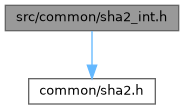#include "common/sha2.h"

Go to the source code of this file.
Data Structures | |
| struct | pg_sha256_ctx |
| struct | pg_sha512_ctx |
Typedefs | |
| typedef struct pg_sha256_ctx | pg_sha256_ctx |
| typedef struct pg_sha512_ctx | pg_sha512_ctx |
| typedef struct pg_sha256_ctx | pg_sha224_ctx |
| typedef struct pg_sha512_ctx | pg_sha384_ctx |
Functions | |
| void | pg_sha224_init (pg_sha224_ctx *ctx) |
| void | pg_sha224_update (pg_sha224_ctx *ctx, const uint8 *input0, size_t len) |
| void | pg_sha224_final (pg_sha224_ctx *ctx, uint8 *dest) |
| void | pg_sha256_init (pg_sha256_ctx *ctx) |
| void | pg_sha256_update (pg_sha256_ctx *ctx, const uint8 *input0, size_t len) |
| void | pg_sha256_final (pg_sha256_ctx *ctx, uint8 *dest) |
| void | pg_sha384_init (pg_sha384_ctx *ctx) |
| void | pg_sha384_update (pg_sha384_ctx *ctx, const uint8 *, size_t len) |
| void | pg_sha384_final (pg_sha384_ctx *ctx, uint8 *dest) |
| void | pg_sha512_init (pg_sha512_ctx *ctx) |
| void | pg_sha512_update (pg_sha512_ctx *ctx, const uint8 *input0, size_t len) |
| void | pg_sha512_final (pg_sha512_ctx *ctx, uint8 *dest) |
Typedef Documentation
◆ pg_sha224_ctx
Definition at line 67 of file sha2_int.h.
◆ pg_sha256_ctx
◆ pg_sha384_ctx
Definition at line 68 of file sha2_int.h.
◆ pg_sha512_ctx
Function Documentation
◆ pg_sha224_final()
|
extern |
Definition at line 994 of file sha2.c.
References fb(), j, PG_SHA224_DIGEST_LENGTH, REVERSE32, SHA256_Last(), and pg_sha256_ctx::state.
Referenced by pg_cryptohash_final().
◆ pg_sha224_init()
|
extern |
Definition at line 978 of file sha2.c.
References pg_sha256_ctx::bitcount, pg_sha256_ctx::buffer, fb(), PG_SHA256_BLOCK_LENGTH, PG_SHA256_DIGEST_LENGTH, sha224_initial_hash_value, and pg_sha256_ctx::state.
Referenced by pg_cryptohash_init().
◆ pg_sha224_update()
|
extern |
Definition at line 988 of file sha2.c.
References data, len, and pg_sha256_update().
Referenced by pg_cryptohash_update().
◆ pg_sha256_final()
|
extern |
Definition at line 577 of file sha2.c.
References fb(), j, PG_SHA256_DIGEST_LENGTH, REVERSE32, SHA256_Last(), and pg_sha256_ctx::state.
Referenced by pg_cryptohash_final().
◆ pg_sha256_init()
|
extern |
Definition at line 279 of file sha2.c.
References pg_sha256_ctx::bitcount, pg_sha256_ctx::buffer, fb(), PG_SHA256_BLOCK_LENGTH, PG_SHA256_DIGEST_LENGTH, sha256_initial_hash_value, and pg_sha256_ctx::state.
Referenced by pg_cryptohash_init().
◆ pg_sha256_update()
|
extern |
Definition at line 476 of file sha2.c.
References pg_sha256_ctx::bitcount, pg_sha256_ctx::buffer, data, fb(), len, PG_SHA256_BLOCK_LENGTH, and SHA256_Transform().
Referenced by pg_cryptohash_update(), and pg_sha224_update().
◆ pg_sha384_final()
|
extern |
Definition at line 950 of file sha2.c.
References fb(), j, PG_SHA384_DIGEST_LENGTH, REVERSE64, SHA512_Last(), and pg_sha512_ctx::state.
Referenced by pg_cryptohash_final().
◆ pg_sha384_init()
|
extern |
Definition at line 934 of file sha2.c.
References pg_sha512_ctx::bitcount, pg_sha512_ctx::buffer, fb(), PG_SHA384_BLOCK_LENGTH, PG_SHA512_DIGEST_LENGTH, sha384_initial_hash_value, and pg_sha512_ctx::state.
Referenced by pg_cryptohash_init().
◆ pg_sha384_update()
|
extern |
Definition at line 944 of file sha2.c.
References data, len, and pg_sha512_update().
Referenced by pg_cryptohash_update().
◆ pg_sha512_final()
|
extern |
Definition at line 905 of file sha2.c.
References fb(), j, PG_SHA512_DIGEST_LENGTH, REVERSE64, SHA512_Last(), and pg_sha512_ctx::state.
Referenced by pg_cryptohash_final().
◆ pg_sha512_init()
|
extern |
Definition at line 605 of file sha2.c.
References pg_sha512_ctx::bitcount, pg_sha512_ctx::buffer, fb(), PG_SHA512_BLOCK_LENGTH, PG_SHA512_DIGEST_LENGTH, sha512_initial_hash_value, and pg_sha512_ctx::state.
Referenced by pg_cryptohash_init().
◆ pg_sha512_update()
|
extern |
Definition at line 802 of file sha2.c.
References ADDINC128, pg_sha512_ctx::bitcount, pg_sha512_ctx::buffer, data, fb(), len, PG_SHA512_BLOCK_LENGTH, and SHA512_Transform().
Referenced by pg_cryptohash_update(), and pg_sha384_update().